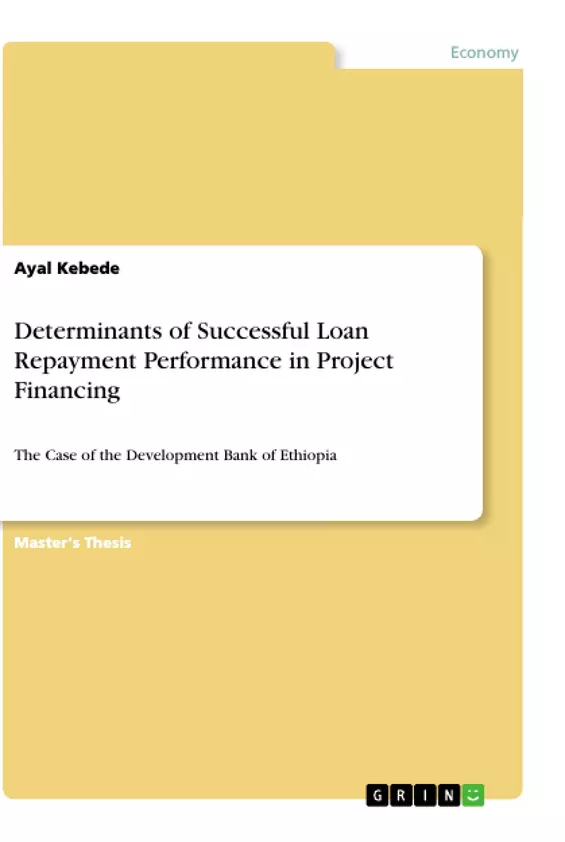This study assesses the determinants of successful loan repayment performance of project financing in the case of Development Bank of Ethiopia. The study uses explanatory design and quantitative research approach. Secondary data was used. The collected data were taken from individual borrowers’ files. Hence, the total sample size was seventy-five (75), of which 40 (53%) were successful financed projects (non-defaulters), whereas the rest 35 (47%) were non-successful ones (defaulters).
The data was analysed via correlation followed by logistic regression model using SPSS version 20. The independent variables used in the study are accessibility of market, amount of loan, availability of raw material, distance from project location to raw material destination, distance from project location to output product market, educational level, equity debt ratio, loan processing time, managerial experience of project manager, number of project follow-up, project implementation period, type of management and type of market for the commodity financed. In the study, a logistic regression model was used to identify variables which determine successful loan repayment performance. The paper reveals that the managerial experience of project managers, loan processing time, educational level, number of project supervisions/ follow-ups by the bank, delay in project implementation period and type of management for the financed projects were statistically significant determinant of loan repayment performance of DBE’s financed projects.
This study suggests that Development Bank of Ethiopia better intensify its project monitoring and follow-up work in order to make well-informed decisions and provide technical assistance for its credit-assisted projects; give due attention to minimize the bureaucracy that delays the loan processing time; critically analyse the project implementation period at the time of appraising projects and enhance its project implementation capacity; identify and redress the root causes of project delays; and improve its efficacy of customer recruitment system by giving special considerations to educational level of borrowers, managerial experience of project managers and type of management, among others.
Inhaltsverzeichnis (Table of Contents)
- ACKNOWLEDGEMENTS
- TABLE OF CONTENTS
- ABBREVATIONS & ACRONYMS
- LIST OF TABLES
- ABSTRACT
- CHAPTER ONE
- INTRODUCTION
- 1.1. Background of the study
- 1.2. Statement of the problem
- 1.3. Objectives of the study
- 1.3.1. General objectives
- 1.3.2. Specific objectives of the study
- 1.4. Hypothesis of the study
- 1.5. Operational Definition Term
- 1.5.1. Dependent (Explained) Variable
- 1.5.2. Independent (Explanatory) Variables
- 1.6. Significance of the Study
- 1.7. Delimitation/Scope of the study
- CHAPTER TWO
- LITERATURE REVIEW
- 2.1. Theoretical review
- 2.1.1. Theory of project
- 2.1.2. Theory of project management
- 2.1.3. Weber's Least Cost Theory
- 2.1.4. Experiential Learning Theory
- 2.2. Credit (project financing)
- 2.3. The Nature and Role of Credit Market
- 2.4. Criteria for Successful Loan Repayment
- 2.5. Determinant of loan repayment performance
- 2.5.1. Loan processing time
- 2.5.2. Due diligence Assessment
- 2.5.3. Credit appraisal study
- 2.5.4. Credit approval
- 2.5.5. Credit Documentation
- 2.5.6. Project Implementation period
- 2.5.7. Credit follow-up/ supervisory visits
- 2.5.8. Output product market access
- 2.5.9. Management skills
- 2.5.10. Distance from project location
- 2.6. Empirical Studies
- 2.6.1. Empirical Evidence in the World
- 2.6.2. Empirical Evidence in Africa
- 2.6.3. Empirical studies in Ethiopia
- 2.6.4. Knowledge Gap
- CHAPTER THEREE
- RESEARCH DESIGN AND METHODOLOGY
- 3.1. Research Design
- 3.2. Population and Sampling Technique
- 3.3. Types of Data and Tools/Instruments of data collection
- 3.4. Procedures of data collection
Zielsetzung und Themenschwerpunkte (Objectives and Key Themes)
This thesis aims to analyze the determinant factors influencing successful loan repayment performance in project financing, focusing specifically on the Development Bank of Ethiopia. The study seeks to identify key factors that contribute to or hinder borrowers' ability to repay loans effectively. The main themes explored in this study include:- The theoretical framework of project financing and credit markets.
- The crucial role of credit appraisal, loan processing, and due diligence in achieving successful repayment.
- The impact of project implementation, credit monitoring, and market access on loan repayment outcomes.
- Empirical evidence and knowledge gaps regarding loan repayment performance in Ethiopia and other contexts.
Zusammenfassung der Kapitel (Chapter Summaries)
- Chapter One introduces the study's background, highlighting the significance of project financing in Ethiopia and the challenges associated with loan repayment. The chapter outlines the research problem, objectives, hypothesis, and operational definitions of key variables.
- Chapter Two delves into a comprehensive literature review, exploring relevant theories related to project financing, credit markets, and loan repayment. The chapter examines existing empirical studies on loan repayment performance in various contexts, including Ethiopia.
- Chapter Three focuses on the research design and methodology employed in the study. It outlines the research approach, population and sampling techniques, data collection methods, and data analysis procedures.
Schlüsselwörter (Keywords)
The core keywords and focus topics of this thesis include project financing, loan repayment performance, Development Bank of Ethiopia, credit appraisal, due diligence, project implementation, credit monitoring, market access, and empirical research. The study delves into the complexities of loan repayment in the context of project financing, analyzing the impact of various factors on borrowers' ability to meet their financial obligations.- Citation du texte
- Ayal Kebede (Auteur), 2018, Determinants of Successful Loan Repayment Performance in Project Financing, Munich, GRIN Verlag, https://www.grin.com/document/962972



